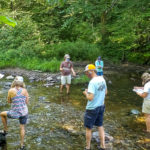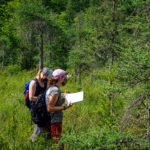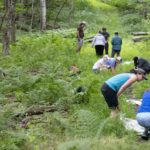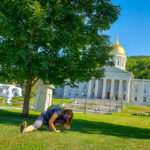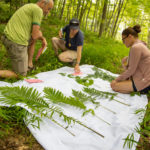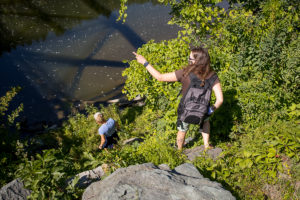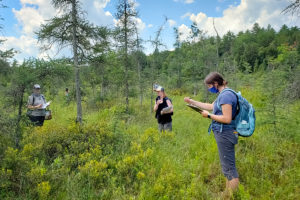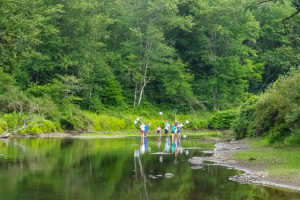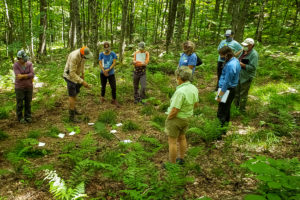Vermont Biodiversity Institute for Educators
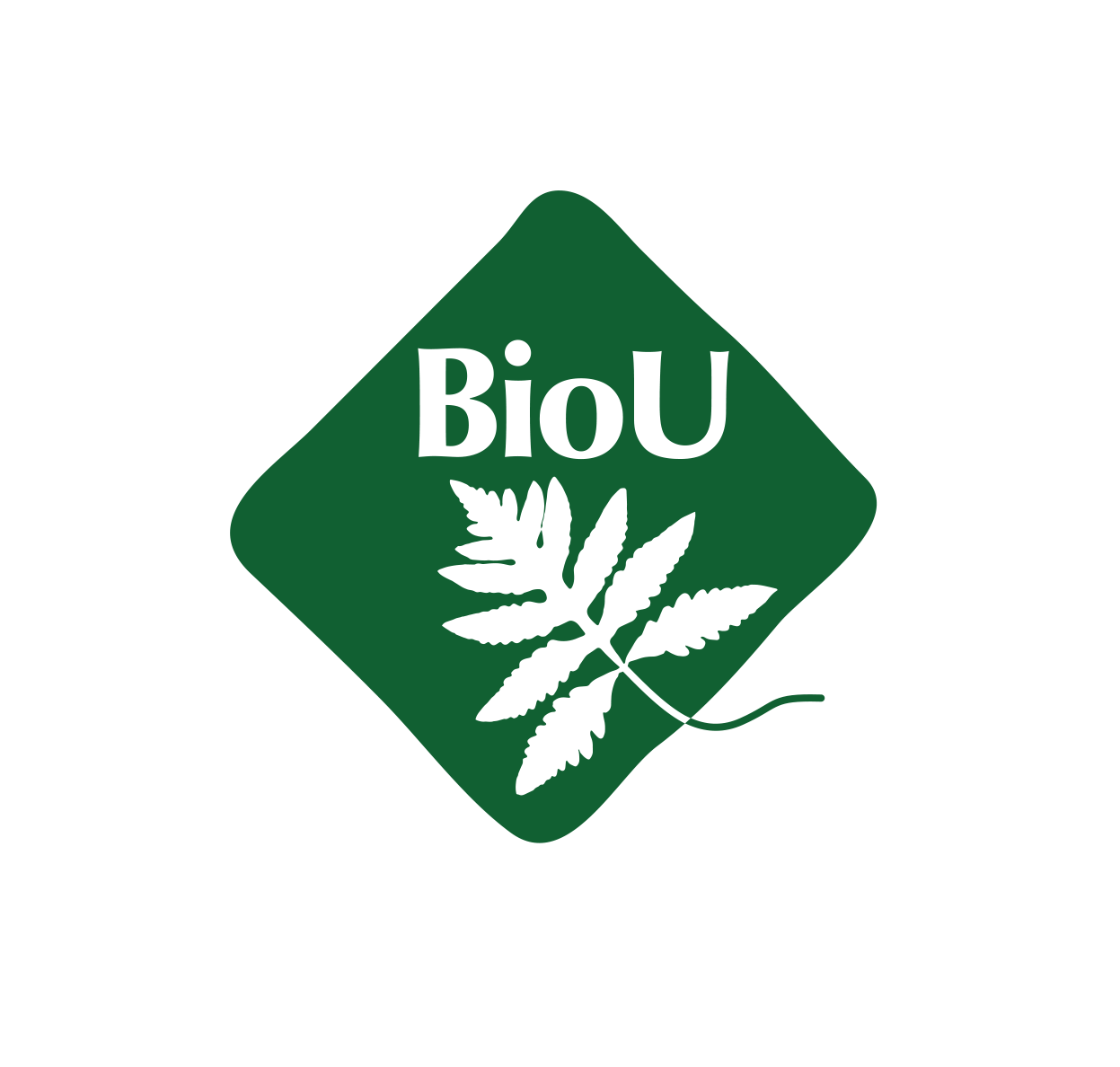
Instructors: Ken Benton & Sean Beckett, NBNC Educators
July 25 - 29, 2022 | $1300 ($1675 with 3 graduate credits)
Class Size: 14 students
See below for financial aid information
T
his week-long investigation of Vermont biodiversity is designed for 7-12th grade teachers and educators looking to incorporate nature-based concepts and activities across their curricula. Each day is spent immersed in a different ecosystem, exploring the species, systems, and processes driving local ecology. We’ll practice field-based activities and classroom-based extensions aligned with Next Generation Science Standards and Proficiency-Based Learning frameworks.
A typical day may include a “BioBlitz” of a local forest, an online biodiversity mapping session, a conversation with state ecologists about conservation and climate change, and picking blueberries during a soggy walk through a beautiful bog.
By the end of the week, participants will be equipped with a range of resources, activities, and frameworks to understand and teach about Vermont biodiversity and its conservation. This course is about reconnecting with local ecology, re-imagining nature-based teaching and learning at the middle and high school level, and cultivating a community of educators passionate about exploring and understanding our wild world.
Course Goals
- Understand and practice frameworks for investigating, understanding and explaining biodiversity in the context of Vermont’s natural resources.
- Introduce activities, tools and routines for incorporating biodiversity and natural history curriculum effectively at the middle and high school level.
- Explore creative alignment of biodiversity and nature-based curriculum with Next Generation Science Standards and Proficiency-based Learning Frameworks.
- Learn how biodiversity and climate change intersect on the Vermont landscape.
- Gain familiarity with a core set of species and communities that represent Vermont’s signature natural heritage.
Course Objectives
- Visit a key suite of Vermont’s Natural Community Types, and become familiar using the Natural Community concept to explain ecological and biotic/abiotic systems in Vermont.
- Practice using tools such as iNaturalist, Google Earth, and VT Agency of Natural Resources’ BioFinder to map and explore biodiversity.
- Practice standards-aligned, field- and classroom-based activities designed to study local biodiversity (e.g. BioBlitz of a local natural area; macroinvertebrate surveys; species identification workshops; etc.).
- Engage with state ecologists involved in rare, threatened, and endangered species work.
- Engage with local land conservation organizations to learn how biodiversity conservation planning is conceived in Vermont.
About the Instructor(s)
North Branch Nature Center is a nationally recognized leader in nature-based education for children and adults. Our place-based and inquiry-based philosophy recognizes nature as our most dynamic, enriching, rigorous, and inclusive classroom. Healthy, inspired learning and development depends on immersive, curiosity-driven nature exploration, cultivated by expert teaching and mentorship.
From our acclaimed Forest Preschool and Educating Children Outdoors (ECO) flagship programs, to our summer camps, community workshops, and professional institutes, NBNC offers a lifetime of learning and growth through deepened connections with the environment.
This program's primary instructors are NBNC Teacher-Naturalist Ken Benton, and NBNC Natural History Program Director Sean Beckett.
Recommended Texts
- Thompson, E.H., Sorensen, E., and Zaino, R. Wetland, Woodland, Wildland: A Guide to Natural Communities of Vermont. 2019 edition.
- Wilson, E.O. 2017. Half-Earth: Our Planet’s Fight for Life.
- Maine Forest Service. Forest Trees of Maine
- Wessels, Tom. Reading the Forested Landscape: A Natural History of New England
- Johnson, C.W. The Nature of Vermont. 1998. University Press of New England.
Lodging Options
There are several nearby options at a similar price point. We recommend the following options:
- Capitol Plaza ($200/night; Montpelier)
- The Inn at Montpelier ($200/night; Montpelier)
- High Hill Inn ($150/night; East Montpelier)
- Comfort Inn and Suites ($120/night; Berlin VT)
- Marshfield Inn and Motel ($100/night; Marshfield, VT)
- AirB&B ($60-$150+/night; options vary)
Camping onsite is available by permission.
Meals
Participants should bring their own lunch and snacks.
Timing
Course runs July 25 - 29, 2022, from 9 am until 4:30 pm each day. Course located at North Branch Nature Center.
Academic Credit / Professional Development Options
This course qualifies for 3 graduate-level education or science credits for an additional $375 course fee. Course is accredited by Castleton University.
For students transferring credit to another institution, it is each student’s responsibility to ensure that their home institution will accept the credit.
Participants pursuing academic credit will be required to complete an additional assignment focused on curriculum development.
All participants qualify for 40 hours of professional development hours and continuing education units. Certificates of completion are provided at the conclusion of the course.
Cancellation Policy
While we realize that unexpected circumstances arise that are out of our control, North Branch Nature Center cannot guarantee refunds for registrations cancelled within 30 days of the course. If a cancellation occurs within this window, NBNC will, if possible, attempt to fill the space from our wait list and provide a full refund.
School Purchase Orders
It is the participant’s responsibility to submit a purchase order request to their school immediately upon registration, and to provide a purchase order number to NBNC in a timely manner. Participants must have either provided NBNC a purchase order number or contacted NBNC to arrange this, within 7 days of registration.
Financial Aid
Vermont residents are encouraged to apply for a VSAC Advancement Grant. Please contact us ([email protected]) to inquire about other financial aid options.
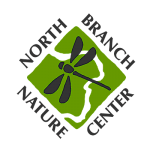
713 Elm Street
Montpelier, Vermont 05602
(802) 229-6206
Hours: Center Open Monday-Friday 9-4
Trails Open 24/7
